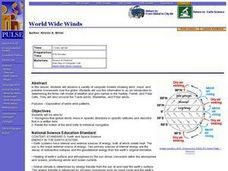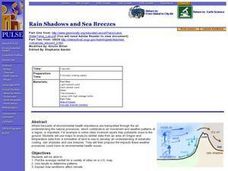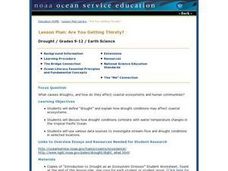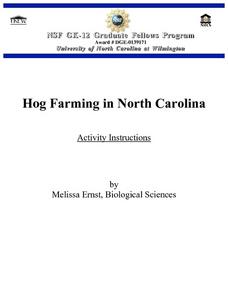Curated OER
Estuaries, Estuarine Habitats, and Adaptations
Middle schoolers conduct research on estuaries. They design and construct an estuary, describe the physical characteristics of an estuary, and create a diagram illustrating an estuarine food web.
Curated OER
Victorian Homes Lesson
Learners investigate British Society in the 19th century by examining Victorian style homes. In this world history lesson plan, students observe photographs of both rich and poor Victorian homes and discuss the main differences between...
Curated OER
World Wide Winds
Students recognize that global winds move in specific directions in specific latitudes and describe that in a written form. They relate the motion of the wind belts to historical navigation.
Curated OER
Trash City
Students work together to build a trash city. They collect items that would go into a landfill to help them build their city. They discuss ways to cut down on garbage.
Curated OER
Erosion
Students discover the meaning of the word erosion and discuss effects of rocks and sticks upon the soil. They then work in small groups to construct a model of erosion to make observations and then write them in their science journals.
Curated OER
Scales, Scutes, and Skins
Students identify the various adaptations of reptiles and amphibians. After distinguishing between reptiles and amphibians, students discuss the ways in which their adaptations aid in their survival. They participate in a hands on...
Curated OER
Rain Shadows and Sea Breezes
Students plot the average rainfall for a variety of cities in the United States. Using the map, they work together to determine patterns on which toxicants are transported through the air. They determine the impacts of various weather...
Curated OER
Create a Commercial
Pupils apply their knowledge of the persuasive appeals by creating a commercial which uses one or more of the three appeals (logos, pathos, and ethos) in order to persuade. They also differentiate among the three appeals as used in their...
Curated OER
Naturally Speaking
Students identify the Earth's natural resources and classify them as renewable or non-renewable. They simulate the distribution of resources and discuss the fairness and effectiveness of the distribution. They identify ways that they use...
Curated OER
Arbor Day
First graders study the importance of trees to our environment. they make their own version of the story by completing the following sentence and then completing an illustration for their writing. "A tree can be ______."
Curated OER
Agriculture Scavenger Hunt
In this science worksheet, students find the words that are related to the finding of terms and information about agriculture for ten questions. The answers are on page 3.
Curated OER
Social Change and Modernization
In this social change and modernization worksheet, students respond to 6 short answer questions and answer 6 multiple choice questions regarding these sociology topics.
Curated OER
Horticulture Crops in the agro-ecosystem
Ninth graders apply ecological analysis to fruit and vegetable production systems. In this horticulture lesson students learn about different management practices.
Curated OER
Are You Getting Thirsty?
Students study droughts and how they affect communities and coastal ecosystems. In this ecosystems lesson plan students use data to examine drought conditions in certain areas.
Curated OER
Seed Germination
Young scholars explore plants and the scientific method. In this plant growth lesson plan, students follow the steps in the scientific method to perform a seed germination experiment as a whole class. Young scholars work in a group to...
Curated OER
Acid Rain: The Disappearing Statue
Second graders examine the effects of acid rain on statues and buildings. They participate in an experiment in which they use different chemicals on building materials. They observe and record their observations.
Curated OER
Harmful Effects of Acid Rain
Students participate in an experiment to become aware of the harmful effects of an acidic solution -- acid rain.
Curated OER
Environment
Fifth graders receive a general overview of the world's environmental dilemmas thereby understanding the global implications of their actions. They examine their connection to the ecosystem by looking at the influence of the environment...
Curated OER
Hog Farming in North Carolina
Students assume the role of a scientist hired by the North Carolina Pork Council to mediate legislative reform and farming needs. Students work with the research group to design a more efficient yet cost effective hog lagoon. Designs...
Curated OER
Soybeans in Space
Students work together to design an experiment that compares and contrasts differnet plant cultivation systems. In groups, they evaluate the results of the experiment to discover if the cultivation system could be used in space. They...
Curated OER
Heat from Light
Second graders explore solar energy. In this science lesson, 2nd graders use hand lenses to see that light energy can be converted to heat energy.
Utah Education Network
Uen: Water Pollution Graphing: Bugs Don't Bug Me
Activity shows the link between land use activities within a watershed and water quality.
BioEd Online
Bio Ed Online: Water
The Science of Water Teacher's Guide provides a number of inquiry-based activities for grades 3-5 (although it can be expanded for other grades). The guide contains science lessons that enable learners to explore water, behavior of...
BioEd Online
Bio Ed Online: Can Nutrients in Water Cause Harm?
Many different kinds of organisms live in water. Excess nutrients can cause over-abundant growth of some organisms living in water and non-point source pollution is a major threat to water supplies in the United States. In this lesson...

























